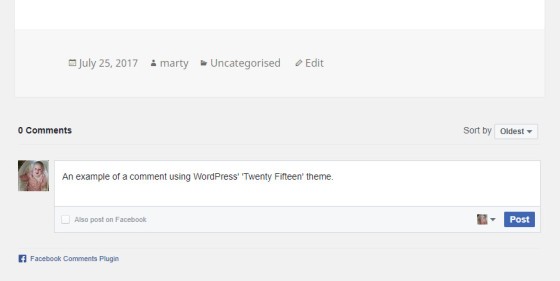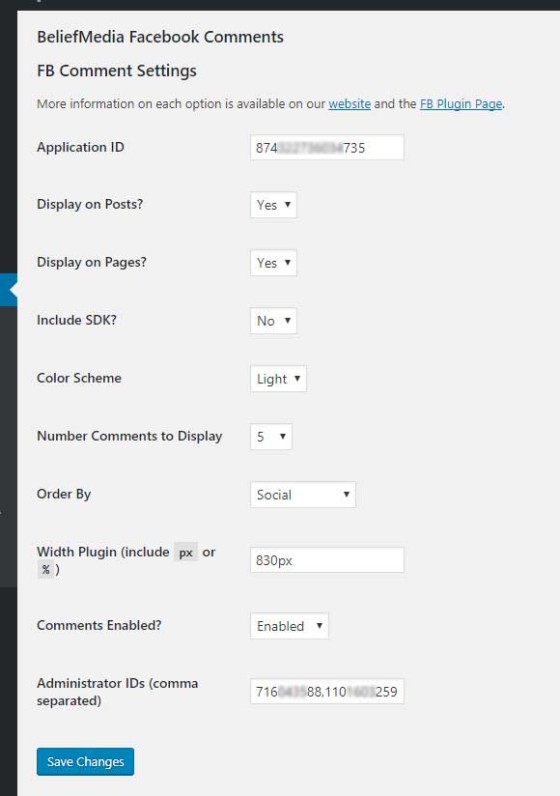The integrated WordPress commenting system is usually more than adequate for most websites and blogs... and there's two reasons above all else that provide a compelling argument for its continued use: ownership and engagement - the latter usually driven by a plethora of social plugins.
When you choose to use a third-party system you're essentially doing away with the data that would otherwise be aggregated by your own database. The integrated comment system permits you to link comments to various platform actions such as sending off related posts to first-time commentators, or redirecting contributors that have made made ongoing efforts to a download or coupon page (we've got plugins for both features just described sitting in draft). The point is simple: the comments are an organic component to your site that can be used to build online advocates. While Facebook has its clear advantages, using it means you don't capture the emails and other details of those that choose to engage.
The only third-party system that might be appropriate, and the only one that I tend to advocate, is the Facebook comment plugin  . Since most of the 2 billion monthly users are constantly logged in, no messy registration or emails are required for a user to comment. Since most people spend most of their online time on social media, it makes sense to integrate your website with social platforms that are intrinsically connected to that of your audience. Facebook permits a user to share their comment on Facebook (this should be encouraged), and the platform offers a measure of quality assurance by removing much of the spam and anonymity that tends to plague the default WordPress system. In addition, having a verified commenter lets you take a sneak peak at who you're talking with and delivers you an opportunity to target them for higher-level conversions.
. Since most of the 2 billion monthly users are constantly logged in, no messy registration or emails are required for a user to comment. Since most people spend most of their online time on social media, it makes sense to integrate your website with social platforms that are intrinsically connected to that of your audience. Facebook permits a user to share their comment on Facebook (this should be encouraged), and the platform offers a measure of quality assurance by removing much of the spam and anonymity that tends to plague the default WordPress system. In addition, having a verified commenter lets you take a sneak peak at who you're talking with and delivers you an opportunity to target them for higher-level conversions.
This article includes a download link to a plugin that is a complete replacement for the WordPress system. The plugin is in early stages and hasn't been tested beyond a single site we operate... so if you find errors please let us know.
Facebook Comments
Integrating comments into your website is exceptionally easy. Facebook provide a form  that'll generate the necessary code that one simply pastes into their website. If written in the most basic manner, a complete plug-and-play WP replacement can be written in just a few lines of code.
that'll generate the necessary code that one simply pastes into their website. If written in the most basic manner, a complete plug-and-play WP replacement can be written in just a few lines of code.
The complexity of Facebook comments comes from the need to create a Facebook application  . This is so comments are linked to Facebook's moderation panel
. This is so comments are linked to Facebook's moderation panel  . The APP ID should be saved via the plugin's admin options.
. The APP ID should be saved via the plugin's admin options.
The Result
A Facebook comment will render as follows:
Plugin Options
Before first use there's a number of options that should be saved. Note that the comments will appear in the same container as your current WordPress comments.
Most options are self explanatory. The comma-separated administrator IDs are the Facebook ID of users approved to moderate or administer comments. A reference to each user is made in the head of your HTML document.
Considerations
- Create your Facebook application here
 . Administer comments here
. Administer comments here  .
.
- Those people that suggest split-testing comment systems side-by-side is a good idea are the same people that continue to buy magic beanstalk beans: they're disillusion. Increasing complexity doesn't increase engagement.
- If you disable comments at the theme-level, re-enable comments on posts and pages and then set your preference via our own administration panel.
- The Facebook plugin supports only text comments. If you're in the business of code or uploading images/documents the plugin likely isn't a good fit.
- Personally, I prefer having a user log in via Facebook to write comments. This enables you to fetch their email and other data, and it retains the default comment system.
Download
Title: BeliefMedia Facebook Comments
Description: Include Facebook comments into your WordPress website as a complete replacement. Includes various admin options.
Download • Version 0.1, 5.1K, zip, Category: PHP Code & Snippets










